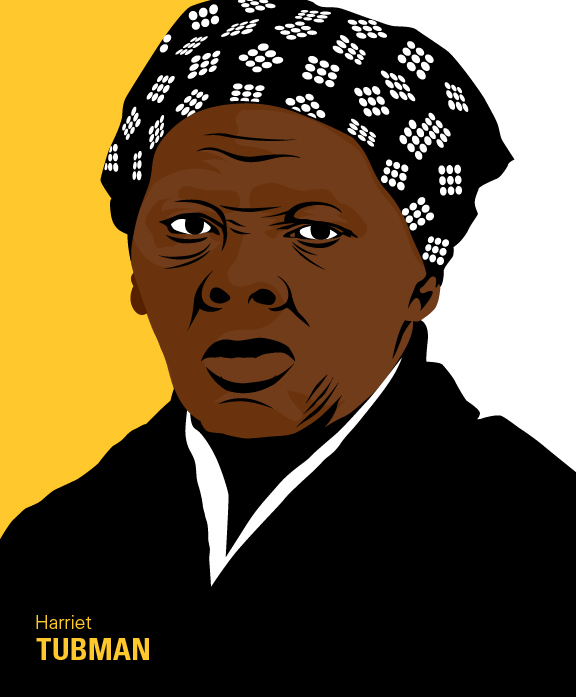Harriet Tubman
 Born into slavery in 1822, Harriet Tubman was an abolitionist and humanitarian who saved hundreds of lives as a conductor of the Underground Railroad, and later as a nurse and caretaker. An icon in American civil rights history, she is widely regarded as one of the leading abolitionists, demanding the end of slavery.
Born into slavery in 1822, Harriet Tubman was an abolitionist and humanitarian who saved hundreds of lives as a conductor of the Underground Railroad, and later as a nurse and caretaker. An icon in American civil rights history, she is widely regarded as one of the leading abolitionists, demanding the end of slavery.
After escaping slavery herself in 1849, she returned to the South at least 19 times to lead enslaved people to freedom. Over the years, she guided more than 300 enslaved people along the Underground Railroad, a network of people and houses stretched throughout Southern slave-holding states toward the north. She spoke proudly of her accomplishments, saying, “I was the conductor of the Underground Railroad for eight years, and I can say what most conductors can’t say — I never ran my train off the track and I never lost a passenger.”
Beyond the Underground Railroad, she also became a spy for the Union Army and was the first woman to successfully plan and lead a military expedition during the Civil War. She was also a nurse for the Union army, tended to the sick and wounded, and caring for soldiers both Black and white. After the war she continued her role caring for her parents and others in need by turning her house into the Harriet Tubman Home for Indigent and Aged Negroes. Upon her death from pneumonia in 1913, she was buried with military honors.
Tubman’s legacy carries on today, and continues to inspire historians, artists and storytellers. She will also be the first African American woman to appear on U.S. currency in 2030, when her likeness will begin appearing on the $20 bill, and was the first African-American woman to be honored through the creation of a national park- the Harriet Tubman National Historical Park in Maryland and a National Historic Park at her home in Auburn, New York.
“Harriet Tubman fought tirelessly for the Union cause, for the rights of enslaved people, for the rights of women, and for the rights of all. She was a leader in the struggle for civil rights who was forever motivated by her love of family and community and by her deep and abiding faith.” — President Barack Obama

-
National Historic Park
Amid bird calls, freshly plowed fields, and the hum of mosquitoes, the landscape that shaped Harriet Tubman’s life as an enslaved child, young woman, and freedom seeker thrives still in Dorchester, Talbot, and Caroline Counties, preserved within the Harriet Tubman Underground Railroad National Monument and National Historical Park.
Learn more -
-
Movie
Harriet: The extraordinary story of abolitionist Harriet Tubman is chronicled in this “powerful” (New York Times) drama starring Cynthia Erivo.
Watch
